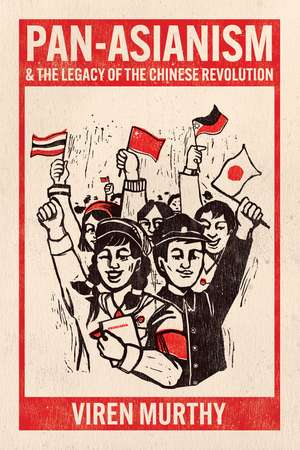Pan-Asianism and the Legacy of the Chinese Revolution
Autor Viren Murthyen Limba Engleză Hardback – 25 oct 2023
Recent proposals to revive the ancient Silk Road for the contemporary era and ongoing Western interest in China’s growth and development have led to increased attention to the concept of pan-Asianism. Most of that discussion, however, lacks any historical grounding in the thought of influential twentieth-century pan-Asianists. In this book, Viren Murthy offers an intellectual history of the writings of theorists, intellectuals, and activists—spanning leftist, conservative, and right-wing thinkers—who proposed new ways of thinking about Asia in their own historical and political contexts. Tracing pan-Asianist discourse across the twentieth century, Murthy reveals a stronger tradition of resistance and alternative visions than the contemporary discourse on pan-Asianism would suggest. At the heart of pan-Asianist thinking, Murthy shows, were the notions of a unity of Asian nations, of weak nations becoming powerful, and of the Third World confronting the “advanced world” on equal terms—an idea that grew to include non-Asian countries into the global community of Asian nations. But pan-Asianists also had larger aims, imagining a future beyond both imperialism and capitalism. The fact that the resurgence of pan-Asianist discourse has emerged alongside the dominance of capitalism, Murthy argues, signals a profound misunderstanding of its roots, history, and potential.
| Toate formatele și edițiile | Preț | Express |
|---|---|---|
| Paperback (1) | 185.07 lei 3-5 săpt. | +15.35 lei 4-10 zile |
| University of Chicago Press – 25 oct 2023 | 185.07 lei 3-5 săpt. | +15.35 lei 4-10 zile |
| Hardback (1) | 573.48 lei 6-8 săpt. | |
| University of Chicago Press – 25 oct 2023 | 573.48 lei 6-8 săpt. |
Preț: 573.48 lei
Preț vechi: 744.78 lei
-23% Nou
Puncte Express: 860
Preț estimativ în valută:
109.79€ • 112.91$ • 91.08£
109.79€ • 112.91$ • 91.08£
Carte tipărită la comandă
Livrare economică 18 februarie-04 martie
Preluare comenzi: 021 569.72.76
Specificații
ISBN-13: 9780226827988
ISBN-10: 0226827984
Pagini: 288
Dimensiuni: 152 x 229 x 23 mm
Greutate: 0.51 kg
Ediția:1
Editura: University of Chicago Press
Colecția University of Chicago Press
ISBN-10: 0226827984
Pagini: 288
Dimensiuni: 152 x 229 x 23 mm
Greutate: 0.51 kg
Ediția:1
Editura: University of Chicago Press
Colecția University of Chicago Press
Notă biografică
Viren Murthy is professor of history at the University of Wisconsin–Madison and the author of The Political Philosophy of Zhang Taiyan and The Politics of Time in China and Japan.
Cuprins
Introduction: Pan-Asianism in the Short Twentieth Century
Chapter One: Asia as Pharmakon: The Early Constitution of Asia as Resistance
Chapter Two: The Critique of Linear Time: Pan-Asianism in Early Twentieth-Century China
Chapter Three: Asia as Anticapitalist Utopia: Ōkawa Shūmei’s Critique of Political Modernity
Chapter Four: Takeuchi Yoshimi, Part I: Rethinking China as Political Subjectivity
Chapter Five: Takeuchi Yoshimi, Part II: Pan-Asianism, Revolutionary Nationalism, and War Memory
Chapter Six: Wang Hui: Contemporary Pan-Asianist in China?
Epilogue: Pan-Asianism, the Chinese Revolution, and Global Moments
Acknowledgments
Notes
Bibliography
Index
Chapter One: Asia as Pharmakon: The Early Constitution of Asia as Resistance
Chapter Two: The Critique of Linear Time: Pan-Asianism in Early Twentieth-Century China
Chapter Three: Asia as Anticapitalist Utopia: Ōkawa Shūmei’s Critique of Political Modernity
Chapter Four: Takeuchi Yoshimi, Part I: Rethinking China as Political Subjectivity
Chapter Five: Takeuchi Yoshimi, Part II: Pan-Asianism, Revolutionary Nationalism, and War Memory
Chapter Six: Wang Hui: Contemporary Pan-Asianist in China?
Epilogue: Pan-Asianism, the Chinese Revolution, and Global Moments
Acknowledgments
Notes
Bibliography
Index
Recenzii
“Murthy’s book is a breathtaking achievement that combines in a true dialectical synthesis what Western intellectuals consider incompatible. This book is necessary reading for all who are interested in our future!”
“Against the view of Asia’s rise as treading the path of the capitalist world, this book articulates powerful visions of pan-Asianism. Rethinking representative Asian and Western thinkers, Murthy illuminates how the imaginaries of Asian solidarity and alliances confronted imperialism and colonialism, and how traditional resources, the Chinese Revolution, and socialism were mobilized in projecting a future beyond capitalism.”
“Since the nineteenth century, the figure of pan-Asian civilization has been imprisoned in permanent standstill, devoid of subjectivity. Murthy brilliantly transforms our understanding by showing how lack was turned into fullness through the proposal that Asia both rescued its own past and provided a crucial supplement to what was missing in the West.”
